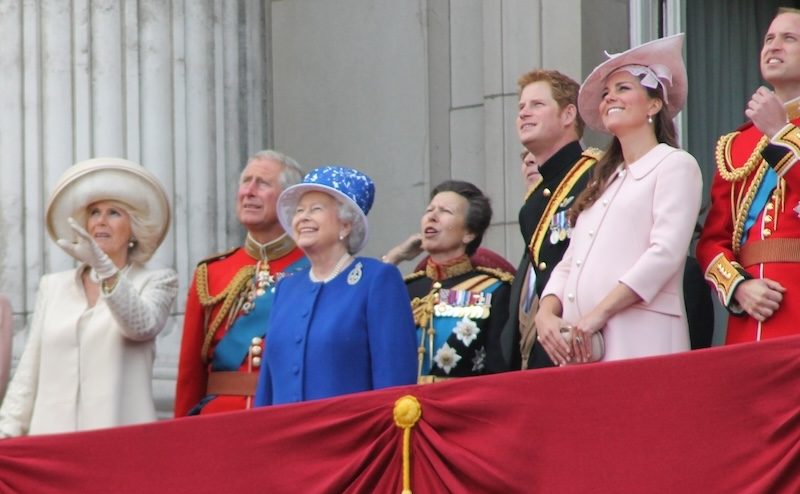Debate surrounding the Royal Family’s purpose and resonance in modern day Britain has drawn mass public response nationally and internationally, including from immigrants and first-generation Britons.
A YouGov study conducted in April 2023 revealed that 38% of ethnic minority Britons believe in keeping the monarchy, while 39% want to replace the institution with an elected head of state.
And with a research briefing from the House of Commons Library that shows immigration to the UK spiked in the last two full calendar years, the split in opinion is becoming more substantial.
Royal commentator Richard Fitzwilliams said: “The monarchy had a very high rating among all age groups, and that included the young, but less so.
“It’s always been that way, the older you get, the more conservative, and therefore it attracts you more.”
The National Centre for Social Research (NatCen) recorded in its annual British Social Attitudes survey that public support for the monarchy hit a record low in 2023.
NatCen has collected data regarding public support of the monarchy since 1983 and last year, those who deemed the monarchy to be ‘very important’ dropped to 29%.
Possible reasons for this sharp decline include Prince Andrew’s alleged involvement with sex offender Jeffrey Epstein, Prince Harry and Meghan moving to California and dropping royal duties, and the Kate Middleton photoshop scandal last month.
Since her last public appearance in December, interest in Kate Middleton’s condition peaked when her Mother’s Day photo was killed by photo agencies due to heavy photoshopping.
It is now known she is undergoing preventative chemotherapy after cancer was found in health tests.
Fitzwilliams, of North London, said: “I do think in recent years, the problems, particularly with the Sussexes, it lost a lot of support because that marriage was pivotal when it came to the Royal Family.”
Market research company Ipsos looked into public opinion of Royal Family members through a poll conducted in January.
Responses from 1,077 adults aged 18 to 75 showed the most favourable royals were Prince William (62%) and Kate Middleton (61%).
As a whole, 49% of respondents had positive views of the monarchy, while 22% responded negatively.
Founder of Serendipity PR Sangeeta Waldron is a first-generation Briton, whose parents arrived from India and South Africa in the 1960s.
She said her mother and grandfather loved all things royal, but her father did not share the same interests.
Waldron, of North London, said: “We were brought up to respect the institution.
“There have been pivotal moments in my life where the Royal Family has had that connection, be it mainly through the big things like a death or a marriage.”
Waldron emphasized the Commonwealth’s importance, as her parents met at the Commonwealth Club, formerly a private members’ club within the Royal Commonwealth Society.
She said: “If you look at most immigrants and most families that come from immigrant backgrounds, we’ve all been part of the Commonwealth, and I think that’s what they do really well.”
Waldron said the Royal Family’s history as a brand with a clear message has shifted dramatically through living in an era of fake news, as it’s increasingly difficult to determine authenticity.
Waldron said: “I think that [the photoshop scandal] eroded a lot of that trust because we want to be able to trust things and know that what we’re seeing is truthful.
“You want to have that trust, so I think it wasn’t handled in the best possible way.”
Sky News and YouGov conducted a poll in late March with 2,081 respondents and determined that trust in the royals remained largely unchanged.
Only 9% said their trust in Kate Middleton lessened, while 68% claimed their opinions are unchanged.
The Sussexes polled the worst, with 54% of respondents claiming they trusted Meghan the least.
Waldron said: “I remember watching Harry and Meghan getting married and for me, it was such a pivotal moment because never in my wildest dreams as a young girl did I think anyone who looked like me or had my skin colour could marry into the Royal Family.
“I suddenly could see the fairy tale, I was part of that fairy tale, and I loved it.”
King’s College London masters student Klara Ismail is a first-generation Briton whose mother immigrated to the UK from Hungary in 1994.
While Ismail mentioned that she does not have strong opinions of the Royal Family, she said her mother does not believe they do anything productive for the country.
Ismail said: “When I was 13 to 16, I liked the queen in the sense that I thought she was a cute old lady.
“I wasn’t interested in the monarchy.”
Ismail said that she thinks immigrants from Commonwealth countries have more affection for the Royal Family, as opposed to other immigrants.
She said: “It’s not a part of my Britishness at all.
“I’d be very happy to have a president instead of a king, and I wouldn’t feel like that would make Britain less British.”
Featured image credit: Carfax2 on Wikimedia Commons licence (CC BY-SA 3.0)





